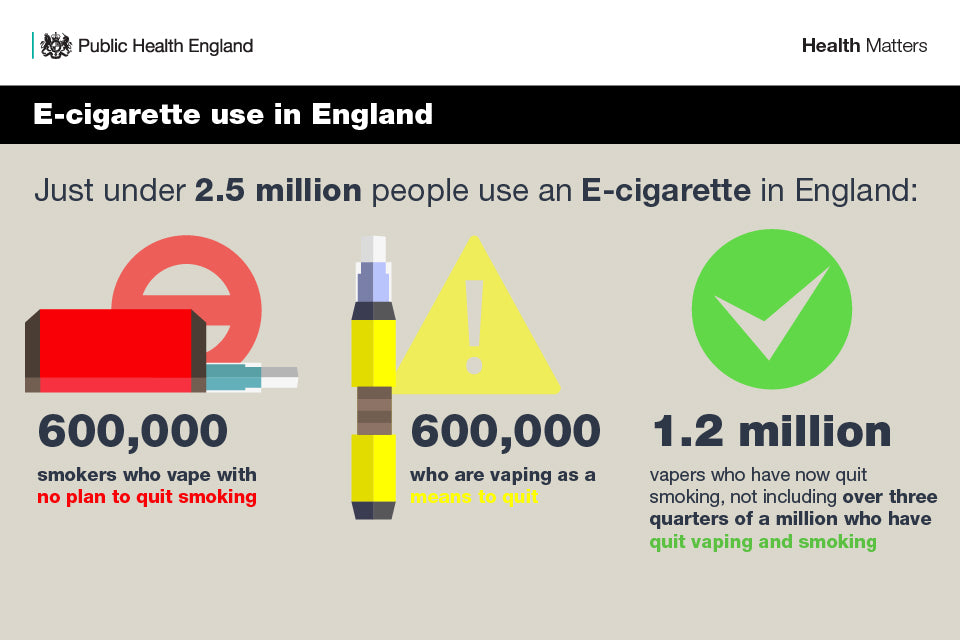Last fact-checked 27 February 2024 | Report a content error
Feel like you’ve got vaping on the brain? Most of us start vaping to rid ourselves of our smoking addiction, but vaping can be just as addictive if you’re not careful.
In this guide, we’ll explain how vaping addiction can occur, what causes the addiction, and how to manage the risks. We'll explain why addictive nicotine is such an important vape ingredient for cigarette quitters, and touch on the difference between a vaping habit and a vaping addiction.
Vaping: Habit Or Addiction?
The first thing to think about is the difference between a habit and an addiction.
Scientists disagree over the precise definition of ‘addiction’ (source: ncbi.nlm.nih.gov). Most of us understand it as a situation where your brain develops a chemical dependency on a substance or behaviour, causing you to ‘need’ it. A habit, on the other hand, is just something you do on a regular basis, usually without thinking. It can certainly take time and mental effort to break a habit, but the fundamental chemistry of your brain isn’t being affected in the same way as it is with an addiction.
You can get addicted to vaping if you use an e-liquid that contains nicotine. Nicotine is an addictive substance, and when you vape nicotine, you are feeding a nicotine addiction. That's why you should only vape if you are trying to quit smoking. It's also why young people and non-smokers should never vape.
What Makes Vaping Addictive?
Nicotine is an incredibly addictive substance found in tobacco smoke. It's the part of a cigarette that keeps smokers hooked. Nicotine is a highly addictive substance, so, in the UK, nicotine sales are regulated by the MHRA (Medicines & Healthcare products Regulatory Agency).
You might be wondering why nicotine is added to e-liquid at all, given how addictive it is. We need to remember why cigarettes were invented: to help smokers quit. The miracle of vaping as a quitting tool is that it can replicate the action of smoking a cigarette and deliver a dose of nicotine at the same time. It curbs cravings and eases the transition from life as a smoker to life as a non-smoker.
Nicotine vaping works as a stop-smoking tool. The latest data from the NHS shows that "You're roughly twice as likely to quit smoking if you use a nicotine vape compared with other nicotine replacement products, like patches or gum" (source: nhs.uk). In fact, recent numbers from Public Health England confirm that vaping has helped more than 1.2 million people in the UK to quit smoking.
Vaping With Nicotine Can Increase Your Addiction
Vaping might be the most powerful weapon we have in the fight against smoking, but it isn't a cure-all. When people swap smoking for vaping, they stop inhaling harmful chemicals like tar and carbon monoxide, which is great news in the short term, but they haven't addressed their underlying addiction yet. As soon as they have quit cigarettes, vapers then need to get to work quitting nicotine ... and that's a process that takes around 3 months (see our 'tapering down' article for more information on nicotine weaning).
One risk of vaping is the lack of dose control. A cigarette will burn down to the filter, at which point the smoker knows that their cigarette is ‘finished’ and they have had a fairly precise amount of nicotine. The same applies to NRT patches, gum and sprays: these treatments come pre-loaded with a set dose. The potential danger with e-cigarettes is that there’s no clear and obvious ‘end’ to a vaping session. You, as the vaper, have to manage your own nicotine consumption.
The good news is that UK laws offer some protections against unsafe levels of nicotine consumption. Legally, nicotine e-liquid can't be sold in bottles larger than 10ml, and can't exceed nicotine strengths of 20mg/ml (read our guide to UK & EU vaping laws).
Can You Get Addicted To Vaping Without Nicotine?
This is where we get into the difference between a habit and an addiction.
There’s no evidence that you can get addicted to vaping without nicotine, but it's possible that the more interested in vaping you are, the more addicted to vaping you think you are.
In a 2018 survey of more than 500 young Canadian vapers, researchers discovered that while almost half of vapers felt they weren’t at all addicted to vaping, some “high sensation-seeking youth, those reading blogs and websites about vaping, those frequently dripping and those using higher nicotine strengths” reported that they felt addicted to vaping. (source: bmj.com).
There’s a good chance that these “high sensation-seeking” Canadians felt addicted to vaping because of the nicotine strength they were using rather than the blogs they were reading, but it’s certainly food for thought.
Either way, if you have never smoked, you should not vape. We still don't know enough about the long-term effects of vaping. If you don't need to vape, our advice is don't start.
Ready to quit smoking? Talk to the NHS first.
The NHS Stop Smoking Service is, by far, the best way to quit cigarettes. Support from an NHS stop smoking counsellor can triple your chances of successfully quitting.
If you follow the advice of a stop-smoking specialist, you can successfully quit cigarettes. Stop smoking counsellors can also help you reduce — and eventually remove — your dependence on nicotine completely.
That's it! I hope this article has given you a better idea of how addictive vaping can be, and that we've given you some good ideas on how to manage your nicotine addiction successfully when you're quitting cigarettes.
Stay safe and happy vaping!
John Boughey


